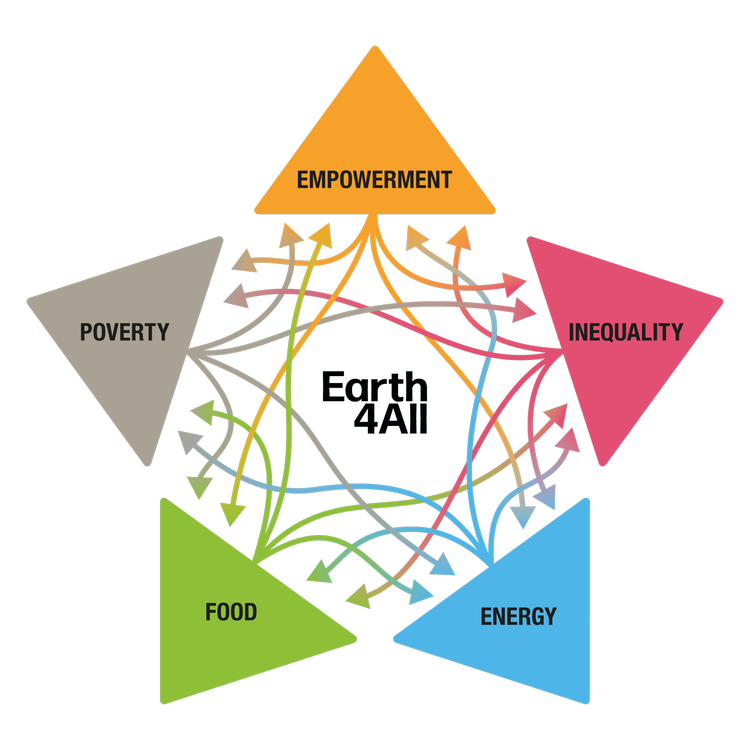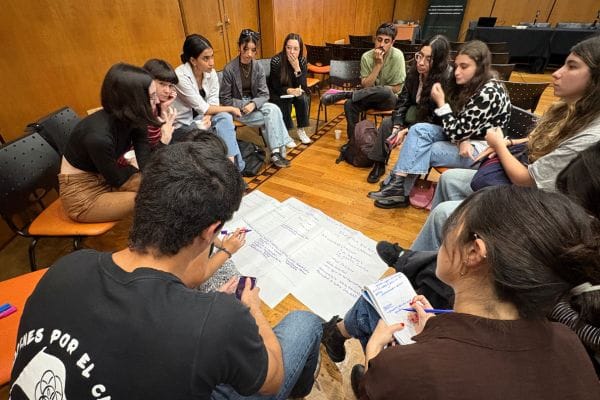Upgrading the economic system
It is feasible to redesign economic and social policies to put our societies on a pathway towards wellbeing for all within planetary boundaries.
The five extraordinary turnarounds presented by Earth4All are the minimum requirements that support wellbeing for all, whilst protecting the planet. Below we outline 15 immediate policies with the most significant systemic and long-term effects in order to achieve this goal.
Achieving the turnarounds will require a rewiring of the global economic system. Governments must shift the focus from economic growth towards what really matters in economic policies: wellbeing. Therefore, in addition to the five extraordinary turnarounds, Earth4All calls for a major upgrade of our economic system to put the economy back in service to people.
There is no “one size fits all” for economic systems change, and what we are proposing is by no means a complete blueprint for it. There are different ways to reach the five extraordinary turnarounds depending on different social and political contexts. Actions to drive these turnarounds in the United States and Canada are likely to be very different to actions in Africa, Europe or Asia for example. We work with local partners on national engagement strategies to champion and establish locally relevant policies.

Eliminate poverty
Extreme poverty has declined dramatically in the last fifty years. But still almost half the world lives in poverty, surviving on less than US$4 per day.
The poverty turnaround focuses on the solutions to raise the national average income to USD$15,000 per year. At this level, if inequality is restrained, the majority of people can enjoy higher wellbeing, greater economic security and more economic opportunities. This will require rapid economic growth at a time when growth is slowing or even stagnating in the poorest countries. The old strategies to drive growth, driven by energy from fossil fuels, are a dead end. New economic models for low-income countries are necessary. New models can help reverse historic injustices and open the doors for unprecedented investment in clean energy, sustainable food and sustainable cities.
Goal
GDP growth rate of at least 5% for low-income countries until GDP per person is greater than USD$15k per year.
System change policies
We propose the International Monetary Fund to allocate over US$1 trillion per year to poor countries for green jobs-creating investments (new “Special Drawing Rights”).
High-income countries should cancel all debt to low-income countries (<US$10.000 income per person).
High-income countries and the World Trade Organization (WTO) should allow local protection of fledgling industries and encourage sustainable export expansion in low-income countries. We propose the WTO to enable leapfrogging by providing Intellectual Property Rights waivers on patented renewables and health technology.
Reduce inequality
Decade by decade, countries have become more unequal in most regions of the world. In many places, the 10% richest take over 50% of national incomes. This is a recipe for deeply dysfunctional, polarised societies. We need a recipe to build cooperation and trust.
New data has allowed us to see an unambiguous pattern related to inequality over recent decades: countries with greater equality perform better in all areas of human wellbeing and achievement. A key goal of the Earth4All inequality turnaround is to ensure the wealthiest 10% take less than 40% of national incomes.
Goal
The wealthiest 10% take less than 40% of national incomes.
System change policies
We propose all governments to increase taxes on the 10% richest in societies until they take less than 40% of national incomes by 2030 (and the share of wealth controlled by the top 10% should continue to decline this century). Stronger progressive taxation and closure of international loopholes are essential to deal with destabilising inequality and luxury carbon and biosphere consumption.
Empower workers – Governments should pass laws to strengthen worker’s rights and trade unionisation. In a time of deep transformation, workers need economic protection.
We propose governments to introduce citizens’ funds to give all citizens their fair share of a nation’s wealth and the global commons through fee and dividend schemes.
Empower women
Gender equity is essential for a fair and just future, and a stable planet.
Massive investment in education for girls and delivering economic security for women are both critically important for a good life within planetary boundaries. This is how we create fair and just societies. Today, societies where everyone feels valued function better. Look to the wealthy Nordic countries of Denmark, Finland, Iceland, Norway, and Sweden. They regularly top international polls on innovation, wellbeing and happiness. It is no coincidence that these market economies invest in gender equity and in families. These countries invest in the future.
There is an important additional benefit. As women have more control over their future, they choose to have fewer children.
Goal
Full gender equity in terms of agency, rights, resources, and power in both law and employment.
System change policies
All governments to increase education access to all girls and women.
All corporations and public bodies to achieve gender equality in leadership positions.
All governments to put adequate pension systems in place.
Transform food systems
The last fifty years have witnessed an astonishing turnaround in food security, with a dramatic reduction in the number of deaths as a result of famine. Progress has, however, come at a cost.
The way we farm, transport and consume food affects more planetary boundaries than anything else. Agriculture is one of the biggest sources of greenhouse gas emissions. It is also the biggest driver of deforestation, biodiversity loss and the creation of vast dead zones in our streams, lakes and oceans. Agriculture is not working for people either, with 9% of our global population severely food insecure at one extreme 8% of deaths globally attributable to obesity at the other. Our food systems are due a comprehensive redesign.
Goal
A regenerative, sustainable food system that works for all within planetary boundaries
System change policies
We propose, from farm to fork, the immediate access to food, reducing overconsumption and an end of wastefulness in food chains.
We call for an end to agricultural expansion against nature. We call upon farmers/fisher folk and regulators to embrace and incentivise techniques for healthier soils/seas, more sustainable and regenerative practices while eliminating harmful subsidies.
We call for a transformation to healthy diets (e.g. grass-fed livestock and new proteins) that respect planetary boundaries.
The energy turnaround
The energy system is at the beginning of the most disruptive transformation in a century. Within a generation most countries could achieve energy security for the first time. This brings with it many more benefits, from clean air and better health to zero fossil-fuel emissions.
The Paris Agreement’s goal to stay well below 2°C requires approximately halving greenhouse gas emissions globally every decade from 2020, to reach close to zero in the 2050s. Solutions to halve emissions in a decade are available, affordable and ready to scale rapidly. Crucially, we have reached the critical inflection point where prices of renewables are comparable or cheaper than fossil fuels. Exciting new solutions now exist in sectors that were once considered hard to decarbonise, such as long-distance trucking, shipping, or cement and steel manufacturing. Urgent action is needed to implement these solutions.
Goal
Net-zero emissions by 2050
System change policies
Immediate redesign and phase-out of fossil-based energy systems.
Energy efficiency and electrify everything: We call upon regulators and industries to start “electrifying everything”, reducing consumption and optimising energy efficiency.
We require the tripling of investments immediately to >$1 trillion/year in new renewables and energy efficiency technologies and practices as well as enhanced storage capacity.
Latest news from Earth4All
Stay in touch
Receive the latest news, events and actions for economic systems change. Sign up for our monthly newsletter.



